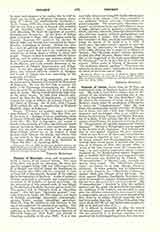

Vincent of Beauvais, priest and encyclopedist. Little is known of his personal history. The years of his birth and death are uncertain, the dates frequently assigned being 1190 and 1264 respectively. It is thought that Vincent joined the Dominicans in Paris shortly after 1218; with the exception of visits to Louis IX at Royaumont, he spent all his religious life in the monastery at Beauvais. A man of industry, Vincent undertook a systematic and comprehensive treatment of all branches of human knowledge. In the preparation of this colossal work, he was helped in the purchase of books by his royal patron Louis IX. The general title of Vincent’s work is “Speculum majus”. The first part, “Speculum naturale”, contains thirty-two books and 3718 chapters, and treats of theology, psychology, physiology, cosmography, physics, botany, zoology, mineralogy, agriculture. Book IX, chap. 40, contains an early reference to the use of the magnet for the purpose of navigation. The edition of the “Speculum naturale” in the Wheeler collection in the Library of the American Institute of Electrical Engineers (New York) was printed in Strasburg, probably in the year 1468. It is in two royal folio volumes containing 694 double column pages of 66 lines to the column. Like other incunabula, it was published without title-page, folio-number or printer’s imprint. The second part, “Speculum doctrinale”, in seventeen books and 2374 chapters, treats of logic, rhetoric, poetry, geometry, astronomy, instincts, passions, education, industrial and mechanical arts, anatomy, surgery, medicine, jurisprudence, and administration of justice. The third part, “Speculum historiale”, in thirty-one books and 3793 chapters, brings the history of the world to A.D. 1250. A fourth part, “Speculum morale”, appears in some editions, but its authenticity is questioned, Daunou (1761-1840) affirming that it cannot be attributed to Vincent. The “Speculum majus” contains 80 books, divided into 9885 chapters, figures which give some idea of the magnitude of the work accomplished by the Dominican Friar in the first half of the thirteenth century. Other works of Vincent of Beauvais are: “De eruditione filiorum regalium”; “Tractatus eonsolatorius de morte amici”, addressed to St. Louis on the death of one of his sons in 1260.
BROTHER POTAMIAN

